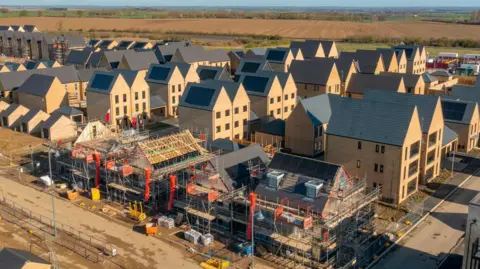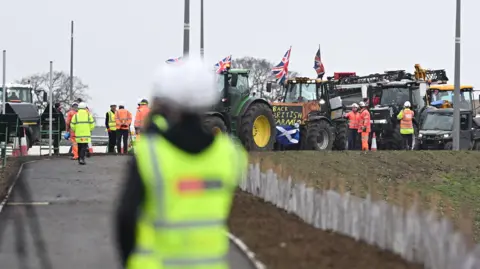Work on new towns to begin by 2029, minister says
 Getty Images
Getty ImagesWork on a number of new towns will begin before the next general election after more than 100 locations across England were put forward, Housing Minister Matthew Pennycook has pledged.
The government says most proposals are to extend existing towns or cities, alongside a "smaller number" of new standalone settlements.
The aim is for each new town to have at least 10,000 homes, contributing towards Labour's 1.5 million five-year housebuilding target.
Each should include infrastructure like public transport and schools, alongside affordable housing, ministers say.
A visit to Milton Keynes by the PM to promote the policy was cut short earlier when farmers driving tractors staged a noisy protest.
The tractors' musical horns could be heard blaring across the building site shortly after Sir Keir Starmer arrived.
It is the latest in a series of protests mounted by farmers against changes to inheritance tax on farms announced at October's Budget.
Creating a new generation of new towns is a key element of the government's long-term plan for housebuilding, and part of its efforts to unlock economic growth.
More than 100 potential sites across England have been suggested to a special taskforce set up to examine the options, after the government asked for expressions of interest from councils, housing developers and landowners.
The sites have not been revealed, but London, the South East, the South West and the east of England have proved the most popular – though there were expressions of interest from every region.
The taskforce will identify specific locations - as well as funding options - by the summer, with a view to construction on the first sites beginning by the time of the next election.
 Reuters
ReutersPennycook told BBC Radio 4's Today programme the aim was to build "well-designed, affordable, attractive homes" that would "eventually house millions of people, just as the post-War waves of new towns did".
He described it as a "transformational programme" that he expected to "make a contribution to housing numbers in this parliament".
However, speaking on Sky News, he conceded: "These things take time to get off the ground. No one's pretending that the new towns programme is going to make up the bulk of that 1.5 million number.
"We're relying on the other changes we've made, including overhauling the national planning policy framework to get new sites coming through."
He said he expected some of the construction to take place on greenfield - or undeveloped - land, but there would also be "big expansions of existing towns and cities where that is appropriate".
"There's got to be sustainable places, as I say, they've got to be well-connected, well-designed."
The plan envisages an initial injection of government funding to buy land, which would be returned when sites were sold for a higher price to private developers, and would help pay for local infrastructure.
Sir Keir said the construction of new towns would form part of "the largest housebuilding programme since the post-war era", and help offer "working people... the security and stability that owning your own home bring".
The Conservatives seized on the new towns announcement to attack the government on immigration.
Shadow housing secretary Kevin Hollinrake said: "Labour's housebuilding plans will do nothing to address the shortage of housing because immigration will just keep piling on the pressure."
Spending review
When the policy was originally unveiled at the party's conference in 2023, Labour set out a plan to use state-backed companies to construct a wave of new towns near English cities, echoing those built by Labour after World War Two.
However, it is not clear how much public money will be allocated to the initiative.
Pennycook told Today this would be decided in the government's spending review which will conclude in June and set spending plans for the next three years.
The review, which is being conducted in a period of minimal economic growth against the backdrop of Labour's self-imposed fiscal constraints, will see ministers haggle for money for their departments.
Chancellor Rachel Reeves has told departments to identify 5% "efficiency savings" as part of the process, to ensure key services are prioritised for funding.
Polly Neate, chief executive of housing and homelessness charity Shelter, urged the government to provide "serious investment" in affordable social housing "to drive up building to the scale the country desperately needs".
"New towns are a huge opportunity for the government to tackle housing need and provide local communities with homes they can actually afford to live in. The government must commit serious investment at the Spending Review in June to drive up building to the scale the country desperately needs."
Clement Attlee's 1945-51 government planned the first wave of new towns to relocate people from poor or bombed-out housing, with development corporations assigned responsibility for building them.
Stevenage in Hertfordshire was the first such town created, with 10 others following by 1955, including Crawley in Sussex, Harlow in Essex, and Newton Aycliffe in County Durham.
Most were intended to accommodate the overspill of people from London.
Since the 1950s, Parliament has approved further developments in England, Scotland and Wales.
